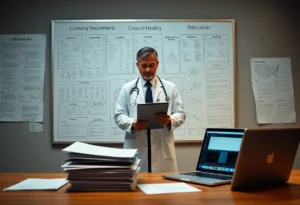Guide your relocation journey with ease and confidence as a medical professional. Moving to a new location can be both exciting and challenging, but with the right information and strategies, you can make the transition smoother. This crucial guide will provide you with valuable tips and practical solutions tailored to your unique needs as a healthcare provider. From understanding licensing requirements to finding housing, you’ll discover what you need to know to successfully navigate your move and continue your impactful work in a new community.
Navigating the Complexities of Licensure and Accreditation
Securing your licensure and ensuring accreditation can be overwhelming, especially when moving between states with differing regulations. Each state has its own set of requirements, processes, and timelines for medical professionals. Staying informed about these elements leads to smoother transitions and helps maintain your career trajectory as you relocate.
Understanding State-Specific Requirements
Your first step is researching the specific licensure requirements in your new state. Most states require a valid medical license, proof of residency, and completion of continuing medical education (CME). Be prepared to undergo background checks and submit your educational credentials for validation to navigate the state’s unique requisites effectively.
Essential Steps for Maintaining Certification
To maintain your medical certification, link closely with the relevant accrediting bodies and keep tabs on license renewal deadlines. Each specialty has different requirements, including continuing education credits. Engaging in professional organizations and attending workshops will not only ensure compliance but also enhance your knowledge and networking opportunities within your new area.
Typically, staying certified involves meeting specific educational criteria and fulfilling practice hour requirements. For instance, many specialties require 25-50 CME hours annually. Additionally, you might participate in recertification examinations every 10 years, depending on your board. Ensure you have a plan for tracking these activities, such as using a dedicated app or calendar reminders, which guarantees that you remain compliant while seamlessly transitioning into your new role.

Choosing the Right Location for Your Career Transition
Selecting the ideal location for your career transition requires a careful assessment of various factors that influence both your professional growth and personal satisfaction. Factors such as proximity to family, lifestyle preferences, and the availability of medical facilities and community resources should guide your decision-making process. Your choice should align with your career aspirations while ensuring a healthy work-life balance in your new surroundings.
Evaluating Job Markets and Opportunities
Researching job markets in potential locations provides valuable insight into demand for your specialty and the types of facilities hiring. Pay attention to employment trends and opportunities for advancement, as well as the presence of professional organizations that can help with networking. States like California and Texas often have a high demand for healthcare professionals, but competition may also be intense; thus, understanding local nuances is key.
The Impact of Cost of Living on Your Decision
Cost of living can significantly affect your financial stability and quality of life after relocating. Weigh the salary offers against the expenses of housing, groceries, transportation, and healthcare in your prospective area. Areas like New York or San Francisco typically offer higher salaries but also come with exorbitant costs that might offset those benefits.
For example, a medical professional considering a move to Los Angeles may find that while salaries for specialists could be substantially higher than in a smaller city, the median home price exceeds $800,000, impacting disposable income and savings. A calculated assessment of how salary and expenses balance can reveal whether a move aligns with your financial goals and lifestyle expectations. Conducting thorough research using cost comparison tools and local economic reports can help ensure you’re making an informed decision that supports both your career and personal needs.
Mastering the Art of Relocation Logistics
Successfully navigating the relocation process necessitates a keen understanding of logistics. Break down each aspect of your move into manageable tasks, from finding a new place to live to organizing your professional paperwork. Set timelines and allocate resources wisely to ensure that nothing falls through the cracks, allowing you to focus more on settling into your new role and community.
Strategic Planning for a Smooth Move
Creating a strategic plan is necessary for a seamless transition. Begin by identifying all tasks that need to be completed and categorize them by urgency. Use a checklist to monitor progress on everything from packing to enrollment in new schools, if applicable. A well-thought-out timeline will help you adjust and prioritize as unexpected challenges arise.
Essential Tools and Resources for Med Professionals
Utilizing effective tools and resources can significantly simplify your relocation experience. Explore apps for managing your moving checklist, connecting with local healthcare networks, and finding temporary housing. Websites that offer reviews and insights from fellow medical professionals can also help you identify reliable movers and neighborhood amenities.
Consider leveraging professional services like relocation consultants, who specialize in assistance for healthcare professionals. These experts can provide tailored recommendations based on your specialty and needs. Additionally, connecting with local medical associations will give you insights into community resources, job opportunities, and networking events. Don’t overlook the importance of online forums and social media groups where fellow medical professionals share firsthand experiences and practical tips. Using these tools will enable you to minimize stress and focus on starting your new chapter on the right foot.
Building a Professional Network in a New Area
Establishing a robust professional network in your new location can greatly enhance your career opportunities and integration into the local medical community. By actively participating in various events, joining local professional organizations, and utilizing online platforms, you can connect with peers, mentors, and other medical professionals eager to share insights and experiences. Such connections not only provide you with support but can also lead to potential job opportunities and collaborations in the future.
Leveraging Existing Connections
Your existing connections can play a pivotal role in easing your transition into a new professional landscape. Reach out to former colleagues, mentors, or alumni from your school who may already be established in the area. They can offer valuable introductions to their network, provide insights into the local healthcare system, and may even know of job openings you aren’t aware of. Utilize platforms like LinkedIn to reconnect and seek their guidance during this pivotal time.
Strategies for Rapid Networking
Rapid networking is an effective approach to quickly build professional relationships in an unfamiliar area. Start by researching upcoming medical conferences, seminars, and workshops relevant to your field—these events are excellent for meeting professionals who share your interests. Attend local meetups, volunteer at community health initiatives, or join online forums specific to your specialty. Additionally, don’t shy away from reaching out directly to professionals whose work you admire, as many are open to engaging in conversation or sharing advice.
To maximize your networking efforts, consider setting specific goals for each event you attend. For example, aim to meet at least three new contacts during a conference or secure one follow-up coffee meeting following an introduction. Prepare an elevator pitch that succinctly summarizes your background and interests, making it easier for you to engage others in meaningful conversations. Always follow up promptly with your new contacts via email or social media, expressing appreciation for their time and suggesting potential future collaborations or discussions. By venturing into your new environment with a proactive networking strategy, you can build a support system that will facilitate your professional and personal growth.
Balancing Personal Life and Professional Obligations
Navigating the dual demands of your medical career and personal life can be challenging during a relocation. Prioritizing your responsibilities requires thoughtful planning and occasional compromises. Set clear boundaries around work hours to ensure that you can dedicate time to family activities or personal pursuits. Communicate your schedule with loved ones and colleagues, establishing a support system that understands the pressures of both your professional and personal commitments.
Finding Family-Friendly Resources
Before moving, research local family-friendly resources that can ease the transition for you and your loved ones. Community centers, parks, and family-oriented events in your new area are great starting points. Educational facilities, childcare options, and support groups can also be invaluable. Don’t hesitate to engage with colleagues or local online forums to glean insights on the best resources available to ensure a smooth adjustment for your entire family.
Strategies for Reducing Relocation Stress
Implementing effective strategies to minimize stress can make the relocation process much smoother. Planning a cohesive timeline that outlines each stage of your move reduces chaos, allowing you to stay organized. Delegate tasks when possible, whether it’s hiring professional movers or asking family members for assistance. Embracing the local community through social events or professional gatherings can also establish a sense of belonging and ease any anxiety that comes with changes in your environment.
Another effective approach is to break down the relocation process into manageable steps. Start with a packing checklist to ensure you don’t overlook necessarys, and create a schedule for utility setups and address changes. Incorporate regular breaks and self-care activities to recharge. Connect with local networks or peers online before your move, as these relationships can offer invaluable support and information about your new environment. Adopting a positive mindset and viewing the relocation as an opportunity for new experiences can significantly diminish feelings of stress.
Final Words
Considering all points discussed in this crucial guide to relocating as a medical professional, you are now better equipped to navigate the complex process ahead. From understanding licensing requirements to finding suitable housing and integrating into a new community, each step is pivotal for a smooth transition. By following the tips and solutions provided, you can minimize stress and ensure a successful relocation that enhances your career and personal life. Take charge of your journey with confidence and clarity.




